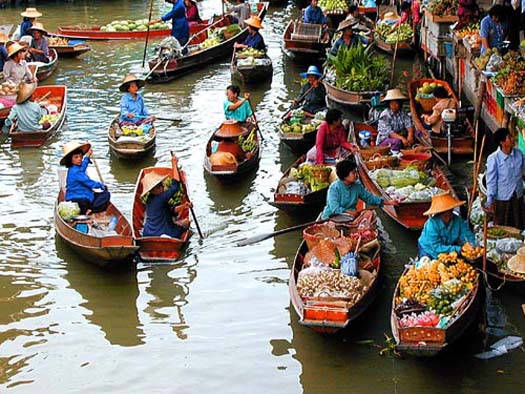
"My vision is to make Laos the center of eco-tourism in South-East Asia," says Thailand RPCV Steve Schipani
Paradise Laos
By DENIS D. GRAY
Laos has discovered a lucrative eco-tourism niche, writes DENIS D. GRAY.
YOUNG Western women, stripped down to bare essentials to catch the tropical sun, pass out candy and coins to begging village toddlers. Their male, backpacker cohorts bargain for some opium and maybe a tribal tryst for the night.
As Asia’s once remote regions are pried open to tourism such cultural collisions become ever-more common and hasten, critics say, the breakdown of vulnerable societies. Environmental harm is often a byproduct.
In Laos, with rich tribal traditions, pristine landscapes and a fledgling tourist industry, the government and foreign groups are hoping there’s still time to head off such damage while reaping some of tourism’s rewards. They’ve met with some initial success.
Here in the mountains of northern Laos, home to the Akha, Hmong and 36 other officially recognised ethnic groups, trekkers are guided to carefully selected tribal villages which receive 10,000 kip (RM6) per each tourist to be used for medicine, schooling and general community welfare. The guides, locally recruited and knowledgeable, explain cultural taboos to the visitors, like not touching gates to Akha villages in which guardian spirits are said to dwell. In turn, they interpret the ways of foreigners to the oft-bewildered hosts. Groups are limited to a maximum of eight so as not to strain supplies of food.
Tourists walking a trail near Luang Nam Tha in Laos. Tourism was the country's top foreign income earner four years ago.
Boontha Chelernsuk, a tourism official, explains that the Nam Ha Eco-tourism Project has brought other benefits. With tourist income coming in, illegal logging and hunting of wildlife by the poor tribesman has diminished and health conditions are improving. As part of the training on how to host foreigners, villagers learn about using toilets, boiling water, sleeping under mosquito nets and preserving the ecology around them.
“Nam Ha has become a model. We’re going to replicate it in other parts of Laos,” says Steven Schipani, a dynamic American who was key in launching the award-winning, government-Unesco project four years ago.
Schipani says the Luang Nam Tha area, with its trekking trails, village destinations and The Boat Landing Guest House, an exemplary eco-lodge, will be used as a field training site for guides and tourism officials from other provinces where similar projects will be planted. Private operators, he hopes, will emulate them and the government and its foreign advisers can then step back to act as regulators and monitors.
“Laos is still very much at the point where we can catch runaway development, but it can go haywire because tourism can be a real money-spinner,” says Schipani. “I worry things can go the way of the freewheeling Thailand model, which makes a lot of money.”
In Laos, tourism became the No.1 foreign income earner in 2000, when the industry added some US$113mil (RM430mil) to the country’s very meager coffers, ranking ahead of hydroelectric power sales, logging and garment exports.
Long isolated by war and communist revolution, the country was “discovered” in the early 1990s and touted as among the world’s shrinking number of “unspoiled places.” Tourist numbers have gone up from 37,600 in 1991 to about 700,000 last year.
Upon realising that nature and cultural tourism were making up more than half of visitor revenues, Laos placed eco-tourism at the core of its official strategy, Schipani says. The Asian Development Bank, European Union, New Zealand and others are offering assistance in support of this focus.
Akha women with homemade trinkets for sale to tourists at a market in Muang Sing.
“My vision is to make Laos the center of eco-tourism in South-East Asia,” says Schipani, a New Yorker who earlier worked as a Peace Corps volunteer in neighboring Thailand. “The decision makers are starting to understand they can’t compete with Thailand in resorts, shopping and nightlife, so they are going the eco route.”
The path offers rewards and some serious challenges.
In a still largely subsistence economy, community-based tourism brings in cash needed by rural people for basic goods and may keep them from migrating to towns in search of jobs, Schipani says. “Village women can make more in one hour by cooking for a tourist than collecting bamboo shoots in the forest for a week,” he explains. “Some of our best guides are former hunters. They can get US$5 (RM19) a day instead of killing a bird for US$1 (RM3.80).”
At the national level, conservation efforts can be strengthened if authorities are convinced that forests and wildlife should be preserved for long-term tourism gain rather than wiped out for one-time sale. Tourism revenue can in turn be used for the environment. Fees from the Unesco effort are used to protect the Nam Ha National Biodiversity Conservation Area, a major wilderness reserve from which the project draws its name.
“It’s all changing very quickly. Ten years ago you could see the Akha in their traditional costumes everywhere. Now, it’s almost all gone except deep inside the countryside,” says Bill Tuffin, a longtime Laos resident and who started The Boat Landing Guest House.
As happened earlier in tribal areas of northern Thailand, some are ashamed of wearing their traditional attire in front of foreigners or don it just to beg or be photographed for a fee.
Tuffin, from Pueblo, Colorado, says backpackers are already shunning some areas because they’re “sort of worn out” and exploring remoter destinations.
“Most tourists don’t want to leave a big footprint. They want to have that meaningful kind of experience with local people,” he says. “But it’s an art to have tourists going into a village again and again and not have them leave a negative impact.” – AP
